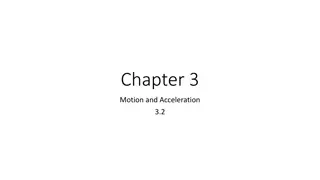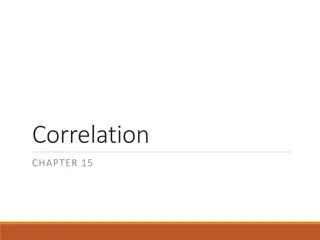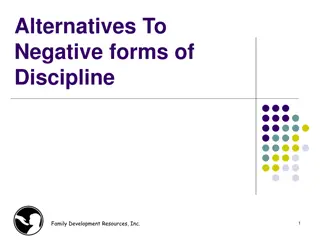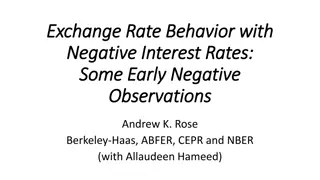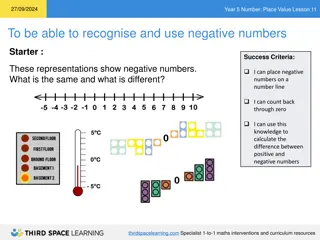Understanding the Positive and Negative Aspects of Fishes
Dr. Mohammad Hamed Bahnasawy, a Professor of fish biology, discusses the positive aspects like diversity and importance of fishes, alongside the negative aspects such as poisonous and venomous fishes, highlighting toxins present in different fish species and risks associated with consumption.
2 views • 28 slides
INTRO TO FBA
Explore the foundational principles of Applied Behavior Analysis (ABA) through the lens of behaviorism, beginning with B.F. Skinner's theories on observable behavior. Learn about positive reinforcement, negative reinforcement, positive punishment, and negative punishment, and how these concepts shap
4 views • 45 slides
Positive and Negative Interactions in Local Environment and Climate Work
Explore the synergies and conflicts between conservation of biodiversity, energy transition, climate adaptation, and reduction of greenhouse gas emissions in local and regional environmental and climate efforts. Learn about the importance of coordinated actions and the potential for positive or nega
5 views • 34 slides
Analyzing Trends in Progress: Positive, Negative, and Neutral Perspectives
Analyze and discuss trends in progress through graphs and conceptual frameworks to determine if they align with positive, negative, or neutral perspectives. Consider the probable futures and preferable outcomes for these trends over the next 50 years. Explore the notion of progress, optimism, and th
6 views • 47 slides
Understanding Negative Results in Systems Research
Systems research encompasses various areas such as operating systems, networking, and distributed systems. Negative results in systems research often go unpublished, leading researchers to focus on curating positive outcomes. This practice can hinder the credibility of scientific findings and impede
5 views • 23 slides
Understanding Punishment and Learned Helplessness in Behavioral Science
Learning from the consequences that result in pain or discomfort is essential in shaping behavior. Punishment teaches individuals to avoid actions that lead to harm. Different types of punishment, positive and negative, affect behavior differently based on the presence or absence of certain stimuli.
3 views • 48 slides
Understanding the Gram Stain Technique in Medical Microbiology Lab
The Gram stain is a crucial technique in bacteriology, dividing bacteria into Gram-positive and Gram-negative groups based on cell wall characteristics. This method involves using crystal violet, iodine, ethanol, and safranin to differentiate between the two types of bacteria. Gram-positive bacteria
0 views • 11 slides
Understanding Electric Charges and Fields in Physics
Electrostatics is the study of forces, fields, and potentials arising from static charges, including positive and negative charges which interact based on the principles of like charges repelling and unlike charges attracting. By convention, electrons are considered negative, while protons are posit
0 views • 12 slides
Analyzing Interaction Effects in Composite-Based SEM
Explore the concept of interaction effects in composite-based structural equation modeling (SEM) through topics like the logic of interaction, estimating effects, multigroup analysis, and visualizing effects. Learn about moderators, their role in relationships between variables, and techniques for a
1 views • 23 slides
Understanding Acceleration in Motion: Concepts and Examples
Delve into the world of acceleration in motion with this informative content. Learn how acceleration is defined, its relationship with velocity, and the different types of acceleration - positive, negative, and zero. Examples like a car at a stoplight, a bouncing ball, and a jet airliner on a runway
0 views • 8 slides
Understanding Contrast Radiography in Veterinary Surgery and Radiology
Contrast radiography is a crucial technique in veterinary medicine that involves using contrast media to enhance visualization of organs and lesions. Different types of contrast media, positive and negative, are used to alter tissue radio density for better demarcation. Barium and iodine compounds a
0 views • 14 slides
Impact of Technology on School and Culture: Positive and Negative Effects
Technology plays a significant role in shaping both school environments and cultural aspects. It has positive impacts such as providing information, enhancing critical thinking, and serving as a medium of communication. However, technology also brings negative consequences like addiction, laziness,
0 views • 6 slides
Understanding Dobby Shedding in Fabric Manufacturing
Dobby shedding is a crucial technique in fabric manufacturing, allowing for the creation of intricate designs and patterns. This process involves the use of a shedding device attached to a loom to produce small motifs. Dobby systems offer a wide range of design possibilities, including Twill, Satin,
5 views • 18 slides
Understanding Correlation in Research Designs
Research designs like experimental, quasi-experimental, and correlational serve different purposes in studying variable relationships. Correlation does not imply causation and can be positive or negative, indicating how two variables change together. The correlation coefficient quantifies this relat
5 views • 43 slides
Understanding Transfer of Learning: Types and Examples
Transfer of learning refers to the carry-over of habits, knowledge, or skills from one area to another. This process influences performance in various situations, as seen in positive and negative transfer examples. Various definitions and types of transfer learning are explored in this special lectu
0 views • 21 slides
Understanding Confusion Matrix and Performance Measurement Metrics
Explore the concept of confusion matrix, a crucial tool in evaluating the performance of classifiers. Learn about True Positive, False Negative, False Positive, and True Negative classifications. Dive into performance evaluation metrics like Accuracy, True Positive Rate, False Positive Rate, False N
3 views • 13 slides
Enhancing Workplace Happiness Through Positive Attitudes and Passion
Explore the key elements of workplace happiness, including positive attitudes, passion for the job, and creating a positive work environment. Learn how recognizing positive and negative behaviors can impact happiness levels in the workplace. Discover strategies for renewal and fostering employee eng
0 views • 26 slides
Understanding Positive Discipline Techniques for Effective Parenting
Children have the right to a nurturing environment free from violence and shame. Negative discipline methods like spanking and yelling can have long-lasting negative impacts on a child's development. By understanding the reasons behind negative discipline practices and exploring alternative positive
1 views • 15 slides
Understanding Exchange Rate Behavior with Negative Interest Rates: Early Observations by Andrew K. Rose
In this study, Andrew K. Rose examines the exchange rate behavior in economies with negative nominal interest rates, focusing on the impact and implications of such rates on exchange rates. The findings suggest limited observable consequences on exchange rate behavior, with similarities in shocks dr
0 views • 42 slides
Understanding Diagnostic Test Accuracy: A Practical Overview
Navigate through the pathway of diagnostic test development, implementation, and evaluation from bench to bedside. Explore the Receiver Operating Characteristic (ROC) curve, the impact of cut-off variations on sensitivity and specificity, and the practical application of continuous measurement in di
0 views • 32 slides
Navigating Healthy Relationships: Recognizing Peer Influence
Explore the nuances of friendships, positive and negative peer pressure, and qualities of relationships. Learn to identify unhealthy behaviors and empower yourself to resist negative influences while fostering strong, positive bonds with peers.
0 views • 14 slides
Understanding Mechanical Ventilation in Anesthesia Technology
Mechanical ventilation plays a crucial role in assisting patients with breathing difficulties by delivering oxygen and removing carbon dioxide. It involves two primary types: Negative Pressure Ventilation (NPV) and Positive Pressure Ventilation (PPV). NPV helps patients with conditions like chronic
0 views • 19 slides
Guide to Giving Negative Commands in Spanish
Learn how to effectively communicate what not to do in Spanish with negative commands. Understand the different forms of negative commands for -AR, -ER/-IR verbs, irregular verbs, direct object pronouns, stem-changing verbs, and verb forms ending in -CAR, -GAR, -ZAR. Master the rules and exceptions
0 views • 12 slides
Understanding Negative -T Commands in Spanish
Negative -T commands in Spanish are used to tell someone what not to do. These commands are often directed at friends or familiar individuals. Forming negative -T commands involves starting with the YO form in the present tense, dropping the O for -ER/-IR verbs, adding -ES for -AR verbs, and includi
0 views • 50 slides
Exploring Negative Numbers in Year 5 Mathematics Lesson
In this Year 5 mathematics lesson on negative numbers, students learn to recognize and use negative numbers through various activities such as placing them on a number line, counting back through zero, and calculating the differences between positive and negative numbers. The lesson also prompts stu
0 views • 23 slides
Implementing Turkish Sentiment Analysis on Twitter Data Using Semi-Supervised Learning
This project involved gathering a substantial amount of Twitter data for sentiment analysis, including 1717 negative and 687 positive tweets. The data labeling process was initially manual but later automated using a semi-supervised learning technique. A Naive Bayes Classifier was trained using a Ba
0 views • 17 slides
Understanding Positive Behavior Acknowledgment in Children
Acknowledging children's positive behaviors is crucial for reinforcing desired behavior patterns. Positive responses help in promoting positive interactions, following instructions, proper communication, and independent self-care skills. It is important to recognize and praise positive behaviors to
0 views • 11 slides
Exploring the Possibility of People with Negative Height
This article delves into the theoretical concept of people with negative height, discussing the probabilities based on normal distribution models and empirical rules. It explores the likelihood of encountering individuals with negative height in today's population, throughout history, and the number
0 views • 10 slides
Non-Negative Tensor Factorization with RESCAL
This article discusses non-negative tensor factorization with RESCAL, covering topics such as Non-Negative Matrix Factorization, Multiplicative Updates, RESCAL for Relational Learning, and Non-Negative Constraint for RESCAL. It explores how factorizing matrices/tensors into non-negative factors can
0 views • 11 slides
Impact of Negative Nominal Interest Rates on Bank Performance: Cross-Country Insights
Examining the effects of negative nominal interest rates on bank performance reveals challenges in maintaining profitability, with concerns around reduced interest rate margins and disruptions to monetary transmission mechanisms. Empirical evidence suggests a reluctance among banks to impose negativ
0 views • 43 slides
Understanding Positive and Negative Reinforcement in Special Education
Positive reinforcement involves rewarding good behavior in children, such as praise or rewards, while negative reinforcement motivates change by removing something unpleasant. Positive reinforcement is usually more effective and includes examples like praising a child for putting away dishes or rewa
1 views • 5 slides
Climate Change Risk Assessment Exercise for Business Operations
This exercise aims to identify, assess, and rank the negative effects of climate change on a company's business operations. It involves analyzing past and projected climate phenomena, assessing their probability and magnitude, and deriving risk values to create a risk matrix. The exercise covers ste
0 views • 16 slides
Impact of Negative Nominal Interest Rates on Bank Performance
Negative nominal interest rates, implemented following the financial crisis, have had a limited effect on bank performance globally. While low rates reduce profitability, banks have shown resilience through adjustments in funding allocations and non-interest income sources. Studies suggest that resp
0 views • 34 slides
School Food Service Update and Financial Overview
Within the School Food Service update, information is provided on negative account balances, personal parent notifications, and payment options available to parents. The data includes details on total negative balances, number of families contacted, and payment methods. Challenges with negative bala
0 views • 5 slides
Understanding Exponents: Zero, Negative, Multiplication, and Division
Explore the concepts of zero and negative exponents, learn how to handle them, and understand the rules for multiplying and dividing numbers with exponents. Remember, anything to the zero power is equal to one, and negative exponents can be transformed into positive by converting the base number int
0 views • 7 slides
Turning Negative Exponents into Positive Exponents Explained
Learn how to convert negative exponents into positive exponents by identifying the placement of negatives in the numerator or denominator, and moving the exponent accordingly. Follow these simple steps to master this fundamental math concept easily.
0 views • 4 slides
Understanding the Impact of Maltreatment on Social Development
Maltreatment, including coercion and abuse of power in family environments, can lead to negative effects on children's social development. It results in lower levels of prosocial behavior, verbal communication, and undervaluing of children. Maltreated children may suffer from low self-esteem, negati
0 views • 15 slides
Understanding the Gram Stain Technique in Bacteriology
The Gram stain technique is a vital tool in bacteriology, dividing bacteria into Gram-positive and Gram-negative groups based on cell wall composition. This differential staining method involves primary staining with crystal violet, followed by a mordant treatment, decolorization, and counterstainin
0 views • 9 slides
Bellman-Ford Algorithm: Shortest Path with Negative Edge Length
The Bellman-Ford algorithm addresses the challenge of finding the shortest path in graphs with negative edge lengths, particularly useful in scenarios such as arbitrage in currency exchange rates. By utilizing dynamic programming and steps iteration, the algorithm efficiently detects negative cycles
2 views • 16 slides
Boosting Image Quality Assessment through Semi-Supervised and Positive-Unlabeled Learning
Incorporating Semi-Supervised and Positive-Unlabeled Learning methods enhances full-reference image quality assessment using less expensive unlabeled data and exclusion of negative samples. The framework involves PU learning with CE and NE losses, as well as SSL with MSE loss for labeled data and ps
0 views • 13 slides









